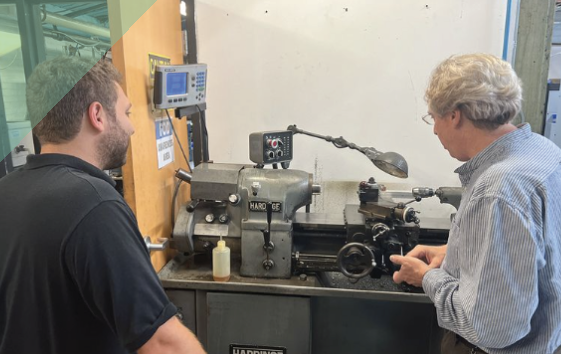Pittsburgh Robotics Factory Helps to Build the Next Wave of Startups
By Todd Miller
 When it comes to the development and commercialization of robotics and artificial intelligence (AI) technologies under the New Economy Collaborative (NEC), which was formerly called the Build Back Better Regional Collaborative, the Robotics Factory is at the forefront under the leadership of Dr. Kevin Dowling, who serves as Managing Director.
When it comes to the development and commercialization of robotics and artificial intelligence (AI) technologies under the New Economy Collaborative (NEC), which was formerly called the Build Back Better Regional Collaborative, the Robotics Factory is at the forefront under the leadership of Dr. Kevin Dowling, who serves as Managing Director.
Formed as part of the NEC initiative, the Robotics Factory was created to further the region’s efforts to grow robotics and AI startups and link them to industry throughout the western Pennsylvania region. In that capacity, Innovation Works is the prime contractor for the Robotics Factory under the umbrella of the NEC, and the Pittsburgh Robotics Network (PRN) is another key partner to the program with strong ties to the Pittsburgh robotics community. Other NEC projects are related to helping companies adopt, manufacture, upskill and help individuals find pathways to entrepreneurship.
“At the Robotics Factory, we are creating something that goes beyond the typical robotics accelerator,” says Dowling, who was a student and scientist at the Robotics Institute at Carnegie Mellon University (CMU) and helped build and lead several industry startups and industry-wide committees.
“The Robotics Factory has built three programs called Create, Accelerate and Scale to do exactly what the name suggests with businesses. This approach is unique to Pittsburgh, and we will work with several industry sectors over the next several years, including aerospace, mining, construction and defense, to help those sectors map and overcome problems or challenges through the formation of startup companies, building products and creating additional business within existing companies."
CREATE - Connecting Industry Problems with Solution Providers
 A significant responsibility of the Robotics Factory’s Create program is to create and manage industry-specific summits that match industry sectors with robotics entrepreneurs, customers and manufacturing partners. Last year’s summit focused on aviation, and this year’s program will focus on agriculture.
A significant responsibility of the Robotics Factory’s Create program is to create and manage industry-specific summits that match industry sectors with robotics entrepreneurs, customers and manufacturing partners. Last year’s summit focused on aviation, and this year’s program will focus on agriculture.
Last year, a half-dozen aviation-focused companies emerged with partners from the summit, and they are collaborating to develop solutions for overcoming the industry-related challenges mentioned. Dowling expects a similar number of relationships to be formed through the agriculture summit.
Specifically, those companies in the inaugural Create program in aviation are working on automated solutions in baggage handling and in-flight water and wastewater management. As of this writing, multiple companies and existing businesses are working to solve many problems in those areas.
ACCELERATE - Helping Entrepreneurs Adopt a Business Mindset
Another key aspect of the Robotics Factory’s work is to help tech-savvy entrepreneurs understand business. As Dowling puts it, “Entrepreneurs understand their technologies well, but many need help with raising money and positioning themselves in the market, and with sales and marketing.” The Robotics Factory Accelerator provides
exactly that kind of support through months of content and programming to help with the non-technical aspects of building a company.
The PRN also plays a key role in this program. Founded by Dowling in 2016, the PRN is led by Jenn Apicella and works with the Robotics Factory and other programs in the NEC.
“The PRN directly connects the robotics business community to these projects, providing valuable connections to experienced founders and leaders who help mentor and advise the next generation of robotics startups and entrepreneurs,” explains Dowling. “We are looking for more individuals running companies, or who have run companies, to serve as mentors to help entrepreneurs develop their businesses. This unique arrangement involves mentors working with companies at no cost from beginning to end of funding cycles.”
SCALE - Helping Companies Grow
In a similar vein, Dowling and his team are helping entrepreneurs through the Scale program to prototype in the Robotics Factory Scale Shop, connect companies with regional manufacturers to build prototypes, first articles, and production units, as well as understand and use manufacturing-related processes such as design-for-assembly, design-for-manufacturing, bill of materials, and bill of process.
“Building one unit is a straightforward process,” says Dowling, “But when you have to make 100, or 10,000 units, that’s a whole different category of activity. After the NEC grant expires in September 2026, we hope to continue beyond that date and sustain the growth our effort will have helped to generate. We are continually learning from our own initiatives and refining our processes to improve them.”
“Over the next few years, we will start to see the results of what is going on now through the collaborative web of organizations in
business, academia and government. That is one of Pittsburgh’s key strengths.”
To promote economic development, the Robotics Factory and the PRN work with the Pittsburgh Regional Alliance (PRA), a non-profit organization part of the Allegheny Conference on Community Development, that works with site selectors, business decision-makers, companies and people from around the world to help them establish their presence in the region.
As a result of those relationships, about a half-dozen companies based outside of the Pittsburgh region, including overseas, have established satellite or U.S. offices in western Pennsylvania. A few companies that have done so include Re:Build Manufacturing, Plus One Robotics, Spyrosoft and
Efficient Technologies. Another half-dozen companies are in discussions and exploring opening
offices in the region.
Those alliances are formed by a top or senior leader in a company hearing or reading about what is happening in the Pittsburgh region on the robotics and AI fronts. Company leaders approach one or several of the organizations mentioned, including the PRN and the Robotics Factory. “We try to work with those companies to understand what they’re looking to do,” says Dowling.
“Whether their focus is on R&D, moving an office here from outside the region, or establishing an office while keeping a presence elsewhere, we connect the companies to the PRA and PRN, which has a tour focusing on what’s happening at the Advanced Robotics for Manufacturing (ARM) Institute, CMU and Re-Build Manufacturing in Tarentum, to name a few. We also connect companies to schools or training organizations, wrapping everything they need into a package to impress them with what Pittsburgh can do for them.”
Established companies accepted into the Robotics Factory Accelerate Program will receive up to $100,000 through Innovation Works (IW), and potential continued support through the IW Seed Fund and manufacturing grants. Hardware startups can apply for manufacturing grants to support the development of the first articles, get introduced to manufacturers in the region and help them access additional funding for longer-term growth.
The Robotics Factory is also involved with IW’s Venture Expo which was held March 20, 2024, with all of IW’s accelerator companies, including the Robotics Factory Accelerator cohort. On that occasion, more than 70 investors saw many funding opportunities.
Looking ahead, Dowling is optimistic about the economic impact that robotics and AI technologies can have on the Pittsburgh region. “It’s amazing to see what’s happening in Pittsburgh. The ability for companies to collaborate and connect with people and form close relationships is creating intersections that might not happen ordinarily.
“Over the next few years, we will start to see the results of what is going on now through the collaborative web of organizations in business, academia and government. That is one of Pittsburgh’s key strengths.”